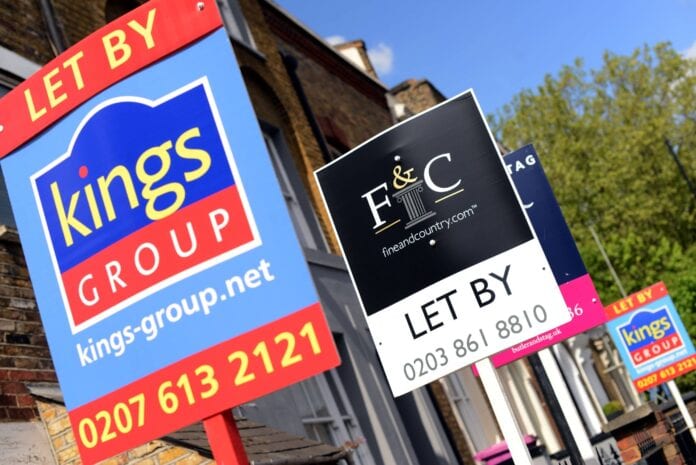
- A quarter of the population find it difficult to pay monthly housing costs, rising to 43 per cent of private renters
- Housing benefit bill to exceed £30 billion in 2022, more than double the funding for new affordable housing until 2026
- Former Prime Minister Theresa May backs the findings, calling on Conservatives to make it ‘our shared mission, once again, to fix this hidden housing crisis as a central plank of our levelling up agenda’
- Polling reveals ‘New Conservative’ voters supportive of social housebuilding programme, alongside reducing immigration and funding the NHS
Nearly half those renting privately in England are struggling to pay their housing costs, a new poll conducted by the Centre for Social Justice (CSJ) and backed by ex-PM Theresa May has found.
A sizeable 43 per cent of private renters find it difficult to pay their rent and bills, with one in ten renters saying they found it ‘very difficult’. A quarter of all English adults said they struggled to pay the rent or mortgage.
The UK’s cost of living crisis is shown by the nation’s astronomical housing benefit bill, which the CSJ argue has ‘ballooned’ as a result of a collapse in the supply of truly affordable housing over several decades.
Official figures published this month showed the number of homes for social rent built annually has fallen to 6,000, despite over 95,000 households currently living in expensive temporary accommodation.
The CSJ has found internal forecasts estimating a housing benefit bill of over £30 billion in 2022, which is expected to double again in real terms over the next thirty years as the number of renting pensioners increases.
But findings presented by the CSJ suggest that rising rents, overcrowding and poor quality housing widespread among lower-earners is also having a profound social impact: reducing the gains of employment, hitting health, education and family life.
A local educational charity told the CSJ: “If you’re a family of five sharing one room, how can you expect a child to engage in their learning or be able to do their homework when they’re at home? Attainment is also about the housing issue.”
Red flags drawn up by renters across the country have led the CSJ to request Government to press forward with a concrete social housing strategy as part of its agenda to ‘level up’ and spread opportunity.
While 55 per cent say building social housing should be a priority of the Government, just 24 per cent believe the Government’s definition of affordable housing is truly affordable to local people, suggesting that it is out of touch with popular opinion.
The poll findings are released in a new CSJ report titled Exposing the hidden housing crisis, which is part one in a two-report series setting out a new vision for social and affordable housing policy in the 2020s.
In the foreword to the report, former PM Theresa May said:
“The dysfunction in our housing system is deep-rooted, having developed over multiple decades and under governments of all stripes. Addressing it fully remains one of the fundamental public policy challenges of our time.
“And so it is welcome that the Centre for Social Justice has set out to develop a new vision for truly affordable housing in England. Because, as the CSJ exposes in this important report, there remains today a ‘hidden housing crisis’ that is exacting a huge toll on our nation’s collective health, wellbeing and finances.
“Rediscovering our tradition of truly affordable housebuilding for the 2020s is what is needed if we are to address the social, economic and fiscal costs of the hidden housing crisis. Moreover, as polling evidence presented by the CSJ suggests, this would be in tune with the views and desires of the new electorate as it has realigned in the years following the Referendum.
“So now I call on Conservatives to let us make it our shared mission, once again, to fix this hidden housing crisis as a central plank of our levelling up agenda.”
To produce the findings, the CSJ partnered with Stack Data Strategy in 2020-21 to carry out a nationally representative poll of 5,000 English adults, and fine-tuned analysis, to segment respondents into distinct groups for further investigation.
Stack Data Strategy, headed up by James Kanagasooriam – who is known for first coining the phrase “Red Wall” – identified six segments of the population whose shared attitudes provide important implications for housing policy: New Conservatives; Shire Tories; Metropolitan Elites; Liberal Centrists; Aspirational Individualists; and the Disengaged Middle.
This exercise revealed that the New Conservative segment – whose votes underpinned Boris Johnson’s electoral majority in 2019 and are expected to be a key determinant of the next election – is highly supportive of government intervention in low-cost rented housebuilding (alongside policies such as Leaving the EU, investing in the NHS and reducing immigration).
Two-thirds of New Conservative voters (67 per cent) said that social housing should be made a government priority, over twice as many as the Shire Tory segment who have constituted the traditional Conservative vote.
This is electorally significant, as according to Stack Data Strategy, 27 per cent of the Conservative vote in 2019 was cast by ‘New Conservatives’, compared to 25 per cent being cast by ‘Shire Tories.’
The poll also found that:
- 60 per cent said they think the housing crisis has worsened significantly due to the pandemic;
- less than one in four people (24 per cent) believe the Government’s definition of affordable housing is truly affordable to local people;
- just under two thirds (63 per cent) believe the Government needs to supply low-cost homes to rent to end the housing crisis;
- 55 per cent said social housing should be a priority of the Government;
- 58 per cent of said building more low-cost homes to rent would ‘level up’ the country; and
- 55 per cent said ‘affordability’ should be the primary aim of housing policy, while 11 percent said ‘eventual ownership’.
- across all segments uncovered in the analysis, agreement outweighs disagreement that ‘a robust social housing scheme reduces the strain on health and social services’ – with strong majority support in most segments.
Andy Cook, Chief Executive of the Centre for Social Justice, said:
“Something has gone badly wrong in the housing market, with the housing benefit bill set to exceed £30 billion in 2022, more than double the funding for new affordable housing until 2026.
“The CSJ’s latest polling suggests that there is considerable public support and a major opportunity for the Government to reset the agenda on truly affordable housebuilding – and to address the social, economic and fiscal problems associated with the hidden housing crisis.
“There is no simple left-right divide in England on what is known as ‘social’ housing, following the seismic realignments in political affiliation seen in recent years.
“Given the scale of disillusionment over current ‘affordable’ housing policy revealed in the polling, we recommend the Government initiates a process of rapid evidence gathering to reshape social housing policy for the 2020s with the forthcoming Levelling Up white paper.
“In the next report in this series, the CSJ will publish a raft of policy proposals which we hope the Government will consider in its efforts to build back better.”
Help keep news FREE for our readers
Supporting your local community newspaper/online news outlet is crucial now more than ever. If you believe in independent journalism, then consider making a valuable contribution by making a one-time or monthly donation. We operate in rural areas where providing unbiased news can be challenging. Read More About Supporting The West Wales Chronicle

























